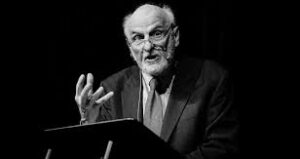As the tanks rolled through Washington,
the Marines landed on the streets of L.A.,
and world leaders gather for the G7+,
what would Walter pray?
Walter Brueggemann died on June 5.

So, I’ve been spending these days
re-reading his Prayers for a Privileged People.
And it came as no surprise
to find a prayer
that speaks directly into the world
that Walter had so recently departed:
a prayer born of prophetic imagination,
a prayer attentive to the dynamics of power,
a prayer in service of those who suffer,
even if offered by those who are privileged.
The Noise of Politics
by Walter Brueggemann
We watch as the jets fly in
with the power people and
the money people,
the suits, the budgets, the billions.
We wonder about monetary policy
because we are among the haves,
and about generosity
because we care about the have-nots.
By slower modes we notice
Lazarus and the poor arriving from Africa,
and the beggars from Central Europe, and
the throng of environmentalists
with their vision of butterflies and oil
of flowers and tanks
of growing things and killing fields.
We wonder about peace and war,
about ecology and development,
about hope and entitlement.
We listen beyond jeering protesters and
soaring jets and
faintly we hear the mumbling of the crucified one,
something about
feeding the hungry
and giving drink to the thirsty,
about clothing the naked,
and noticing the prisoners,
more about the least and about holiness among them.
We are moved by the mumbles of the gospel,
even while we are tenured in our privilege.
We are half ready to join the choir of hope,
half afraid things might change,
and in a third half of our faith turning to you,
and your outpouring love
that works justice and
that binds us each and all to one another.
So we pray amidst jeering protesters
and soaring jets.
Come by here and make new,
even at some risk to our entitlements.
……
This is, of course, all too “woke”
for the Christian cheerleaders
of Donald Trump.
This is all too inclusive
for a state of deportation.
This is all too empathetic
for a manly warrior culture.
The division of church and state
may need to come down
as the state becomes a church,
under an ideology of Christian nationalism …
but let’s not bring Jesus into it,
let’s not hear his words
speaking uncomfortably into our lives,
into our politics,
into our pulpits,
into our prayers.
But notice that while this prayer
is uncompromising in its tone,
there is not a moment of self-righteousness.
We “faintly hear the mumblings
of the crucified one.”
We “are moved by the mumbles of the gospel.”
There is no strident
“thus saith the Lord”
about this prayer.
No, this is a prayer
from a place of privilege.
A prayer only “half ready”
to join the choir of hope,
because we are
“half afraid things might change”
if the prayer was to be answered.
But in the impossible “third half of our faith,”
the prayer turns to the Holy You,
the One of outpouring love
who works justice and
who binds us each and all to one another,”
and, “amid the jeering protesters
and soaring jets,”
dares to pray,
“Come by here and make new,
even at some risk to our entitlements.”
I find some hope and comfort
in such a prayer,
and I am glad anew for the piety
of Walter Brueggemann.
